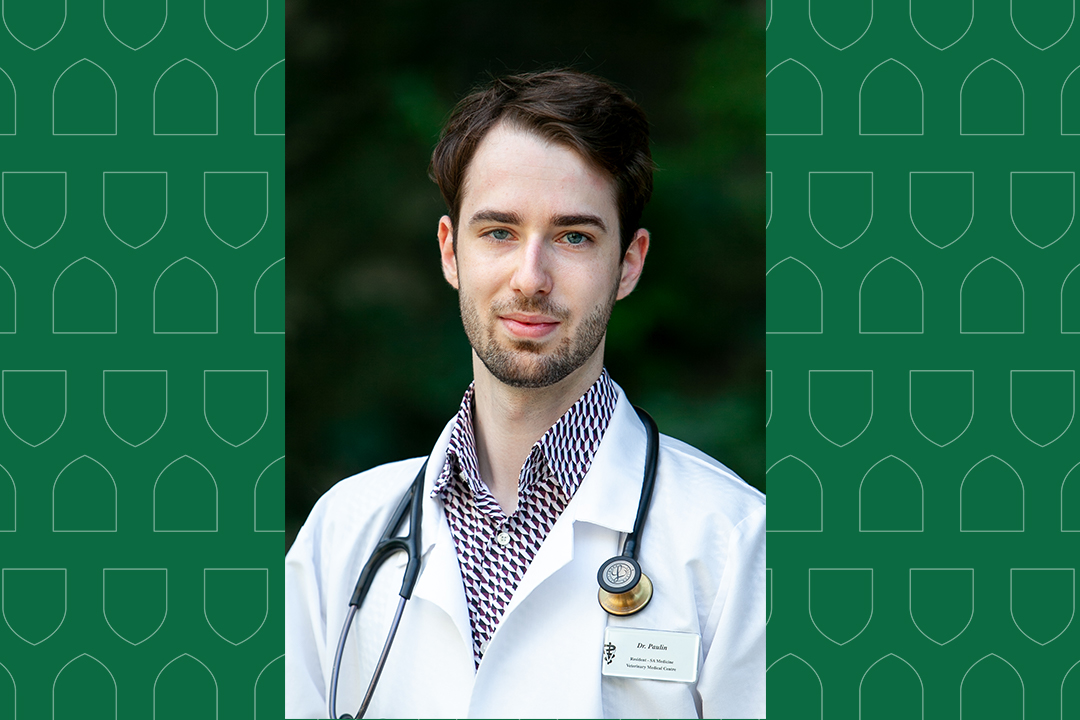
A passion for pets
Growing up in the French countryside, Dr. Mathieu Paulin was always surrounded by pets of all kinds including dogs, a goat and many ducks.
By Jeanette NeufeldWhile a love for animals was a constant in his life, it wasn’t until Paulin reached adulthood that he considered a career as a veterinarian — a job that would allow him to combine his interest in connecting with people and their pets with his love for science.
Paulin, now a small animal internal medicine resident at the Western College of Veterinary Medicine (WCVM), was recently rewarded for his interest in pet health research by the Companion Animal Health Fund (CAHF). Paulin is the 2022 recipient of the Dr. Michael Powell Award of Excellence, a graduate award supported by the CAHF. The $1,000 award recognizes a WCVM graduate student working in a companion animal-related field who excels in academic and research activities.
In addition to this honour, Paulin was one of 12 WCVM graduate students to receive a CAHF tuition award this spring. He also received the 2022 Dr. Dennis Shute Memorial Award for his outstanding efforts as a veterinary clinician and scientist.
After graduating from the École Nationale Vétérinaire d’Alfort in Paris, Paulin began a rotating small animal internship at the Université de Montréal and was later matched to the WCVM for an internal medicine internship program.
“I wanted to stay in Canada — I love Canada. I like the way people practise. I like the organization, the clinics, the owners’ commitment,” he says.
Paulin arrived at the WCVM in 2020 and completed a one-year internal medicine specialty internship before beginning his residency in 2021. He’s also working toward transferring his Master of Science degree to a PhD degree program.
His research focus is endocrinology, or diseases related to problems with hormones, and he’s pursuing two CAHF-supported research projects under the supervision of Dr. Liz Snead, a professor in the WCVM’s Department of Small Animal Clinical Sciences.
His first project focuses on adrenal deficiency, or Addison’s disease, in dogs. This uncommon disorder occurs when the adrenal glands produce an incorrect amount of hormones.
“I have always been passionate about this disease,” he says. “Once you recognize and diagnose this disease and treat appropriately, you go from a dying patient in a crisis in ICU, which everyone thinks won’t make it, to a patient that can gradually have a normal life, with a good quality of life.”
While the disease is uncommon, patients at the WCVM’s Veterinary Medical Centre (VMC) come from across Western Canada seeking care, and so Paulin often has an opportunity to diagnose and treat the disease in canine cases at the hospital.
His second project focuses on methods for diagnosing diseases that can cause pets to drink and pee too much (water dysregulation). While clinicians frequently see pets that present with these issues, they can also be symptoms of less common diseases called diabetes insipidus and primary polydipsia, which are both challenging and expensive to diagnose.
The current standard for diagnosis in dogs relies on evaluating the antidiuretic hormone (ADH). Paulin’s work is focused on evaluating whether a hormone called copeptin could be used as an alternative marker for these two diseases.
“In human medicine, copeptin is a very hot topic. Recently, human labs stopped measuring ADH and now measure copeptin. In dogs, this has never been done,” says Paulin. “It’s taking something from human medicine and trying to apply that to dogs.”
Ultimately, his goal for his research is to improve the standard diagnosis and management of these different hormonal conditions.
“I’ve always been very happy to do research because it’s nice to forward the knowledge to the veterinary community,” says Paulin, who plans to work in veterinary academia. “I feel happy when I have this balance of research, teaching and the clinic.”
